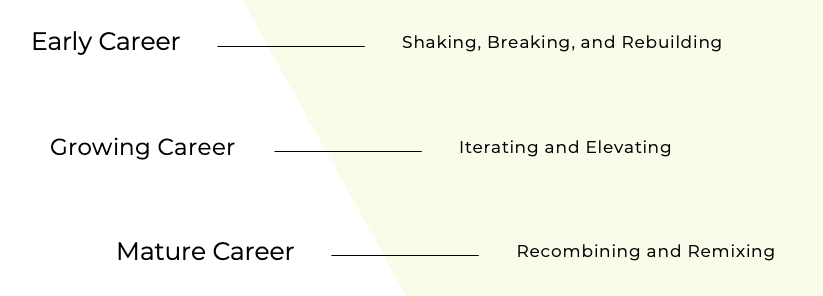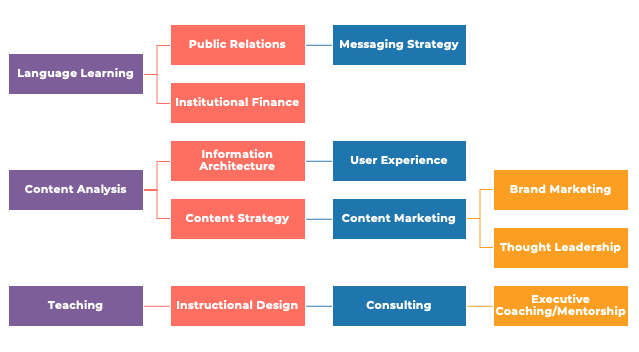What the French?

Career Change in a Changing World
People often ask me how I got from a PhD in French literature to founding and running a thought leadership agency for institutional finance. It's one of my favorite stories to tell—not because it's about me, but because it's about transformation and resilience. It's about taking what you have, shaking it to pieces, and building something new. And it's something still happening and teaching me. Bibliothèque Nationale de France.
Before I talk about ways to redefine and rebuild your career over the long haul, it might make more sense if I outline the basic narrative. You can scroll past it if you'd rather get to the takeaways.
From There to Here
Part One
I went straight through undergrad to grad school with degrees in French Literature and then into a university teaching position. No pause, no reflection. The problem, as it turned out, was that I hated working in academia. Teaching and scholarly work were fantastic. But the profession itself was just shit.
Vicious professional norms disgusted me. Unspeakably toxic departmental politics didn't help. When your colleagues and office neighbors are screaming at each other, crying, and slamming doors, it changes you. The shrinking French Lit job market offered no viable exits.
So there I was, ten years of my life invested in a niche within a niche (19th-century French novel), sitting in a place of wreckage and despair. I had to get out, but it was hard to do when everything I thought I was committed to doing was invalidated.
University admin seemed like the next best thing. I helped faculty use emerging Internet technology for teaching and research. But I found the organizational dynamics just as untenable—incessant and meaninglessly jockeying for almost nothing. Would I have to start over completely?
Making a Major Pivot
As it turned out, no. I had an understanding of education and instructional design. I knew how to deal with large amounts of content. My dissertation focused on a series of 20 novels and the relevant scholarship and theory needed to say something about them. I found a job doing document engineering for a knowledge management company and then a new position doing content and information architecture at a digital agency.
In the latter position, I eventually became the firm's Director of User Experience and also led some of its highest-ticket client relationships. But I hit a ceiling and started to get a bit bored. Much of my work focused on managing and communicating strategic business change. Those seemed like a new angle to pursue, so I took a leap.
My first few months at a PR firm were tough but good learning. I was supporting one of the most premium names in business strategy, dealing directly with the client's senior partners, helping them focus and communicate their ideas for media and other public channels. It was great until it wasn't. Toughness without learning was just abuse. And I left.
Pivoting as Resilience
It was time to start my own firm. In 2007, Syncresis emerged from my vision for working with clients and my sensibility for how work should be. I cloned what I knew, becoming a small digital agency emphasizing UX and communication. We did digital strategy and implementation and worked with clients from many industries. We had a good model, but there were also some lean years.
Just at the right moment, a former client offered me a full-time role that would pick up on my past experiences as a writer in comms and marketing. It would mean focusing on one client and one industry indefinitely. That focus acted like a seed crystal. I saw a massive gap in marketing and communications in institutional finance.
The topics are hard to understand as a novice. They are hard to distill into clear, crisp messaging. You need to be a translator between marketing practices and highly specialized topics. Often, there's a broken dialogue between marketers and their business stakeholders. I realized I could fix all of that if I concentrated on this one niche and helping clients with thought leadership and content creation.
Focus and Evolution (Never Finished)
Since doing that seven years ago, my business has strengthened and grown by a factor of three in revenue. One thing we're doing now is distilling what we know about premium thought leadership working with top-tier clients into packaged products. We launched a coaching program for startup founders and are working on a fully self-contained training course for 2024. We're also building offerings for newly-appointed CMOs to help them get a running start in their new roles.
Intentional Transformation: A Repeatable Process for Change and Growth
Everyone's circumstances differ, but I think many professionals can use a process like this to develop. Whether you want to get out of a dead-end role or a toxic environment, or have to react to harsh circumstances like downsizing, you can follow a three-step process that builds on itself.

Shaking, Breaking, and Rebuilding
- Take inventory of your core talents and break them down into skills
Once I decided to walk away from university humanities departments, I had a painful few months of regret and mourning. But I began to generalize my talents. I reached where I did because of my language learning, content analysis, and teaching strengths. Everything I do now ties back to that core talent platform. - Identify skills you currently have
My assets weren't simply talents. They translated into specific skills. I excelled at writing and communicating. I excelled at researching and organizing complex topics. I excelled at designing curriculum and materials. - Anticipate adjacent skills within easy reach
At the start of the first dot.com boom, I saw parallels between my humanities professor skills and the kinds of jobs available in the business world. - Imagine three to five job roles using those skills
I considered several possible next steps. I reasoned that university admin would be more transferrable to a corporate role. I watched emerging jobs in areas like content and user experience. And I learned what I needed to translate my existing skills into related new skills. - Land or create your next reasonable position
It wasn't just about skills or qualifications. Getting hiring managers to look at someone with a "weird" degree took some creative convincing. One of my favorite interview questions was whether I worried about dealing with corporate politics coming from the innocent world of academia. I laughed. And I got the job.
Iterating and Elevating
- Identify development opportunities to strengthen and add to your skills
Once I was hired as a junior content analyst, I looked around to see what I liked. Planning, making decisions, managing people, leading teams, building client trust—I saw people in my company doing those things, and I watched in fascination. - Map your skills to future roles and goals
I still needed to figure out how to go from one thing to another. Content led naturally to information architecture, which led to content strategy and program management, then client management, and then business development, for example. - Evolve into new roles (either up or out)
I set myself loose targets. Either I'd be promoted into more senior roles or get hired into one by another company. I was lucky enough to work in a company that supported growth. But once I felt like I had hit a limit, I moved to another firm (from a digital agency to a PR agency). - Elevate your skills in line with your core talents
Some things seem to come naturally. For example, I was great at media training because I have a core talent as a teacher. I was great at messaging because I could quickly get to the heart of complex ideas. And these led me into more leadership level and strategic roles.
Recombining and Remixing
- Wield Your Superpower
Once you navigate a few transformations, transformation itself becomes one of your best skills. It gives you endless opportunities for renewal on a firm but resilient foundation. - Never Stop
All of the above allowed me to recombine all my skills and experience into starting my own firm. I can see and pursue adjacent moves with high comfort and confidence. My repeatable process formed somewhat organically, but once I learned to see and reflect on it, I recognized it as a way to succeed and thrive.

Regardless of your core talents and skills, you can use the same approach to intentional transformation to grow and respond to change throughout your career.
Three Grace Notes
"Understand that you have within yourself herds of cattle,” says Origen in the third century (in Patricia Cox’s translation), “flocks of sheep and … goats … and that the birds of the air are also within you … You see that you have all those things which the world has.” — James Hillman, Animal Presences
"Failure to face the realities of change brings heavy penalties. Individuals become imprisoned in their own rigidities. Great institutions deteriorate. Civilizations fall. Yet decay is not inevitable. There is also renewal." — John W. Gardner, Self-Renewal
"To discern what is truly essential we need space to think, time to look and listen, permission to play, wisdom to sleep, and the discipline to apply highly selective criteria to the choices we make." — Greg McKeown, Essentialism
